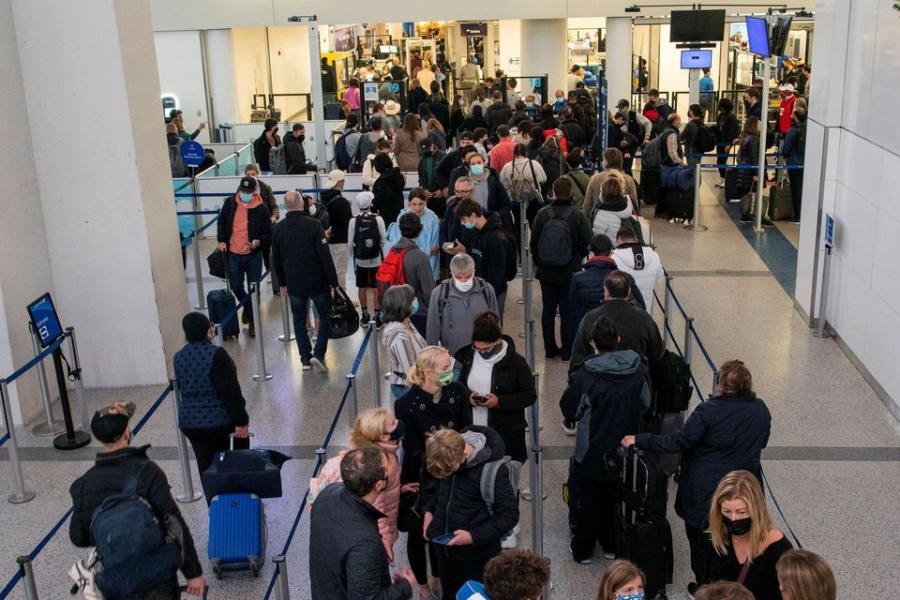
Published :
Updated :

Air travellers to the United States will face tougher Covid-19 testing rules, as several countries moved to seal-off their borders amid heightened uncertainty around the virulence of the Omicron variant and its ability to dodge existing vaccines, reports Reuters.
In Asia-Pacific, Japan and Hong Kong said they would expand travel curbs, while Australia braced for more cases of the coronavirus variant after at least two people visited several locations in its biggest city while likely infectious.
In an attempt to stave off hasty border curbs, the World Health Organization (WHO) urged countries to apply "an evidence-informed and risk-based approach" to travel measures, saying "blanket travel bans will not prevent the international spread, and they place a heavy burden on lives and livelihoods".
Investors remained on edge on Wednesday, even as financial markets came off lows plumbed a day earlier following remarks by the CEO of Moderna that raised questions about the efficacy of Covid-19 vaccines against Omicron.
Global health officials have since offered reassurances and reiterated calls for people to get vaccinated.
"Even if the new variant becomes more widespread, the vaccines we have will continue to provide protection," European Medicines Agency Executive Director Emer Cooke said.
Laboratory analyses should indicate over the next two weeks whether the blood of vaccinated people has sufficient antibodies to neutralise the new variant, Cooke said, echoing remarks by vaccine maker BioNTech and scientists.
BioNTech's CEO said the vaccine it makes in a partnership with Pfizer would likely offer strong protection against severe disease from Omicron.
Britain and the United States have both pushed their booster programmes in response to the new variant.
First reported in southern Africa a week ago, Omicron has triggered global alarm, roiled markets, led to travel bans, and highlighted the disparity between massive vaccination pushes in rich nations and sparse inoculation in the developing world.
Some 56 countries were reportedly implementing travel measures to guard against Omicron as of November 28, the WHO said.
"I well understand the concern of all countries to protect their citizens against a variant that we don't yet fully understand," WHO head Tedros Adhanom Ghebreyesus said.
"But I am equally concerned that several member states are introducing blunt, blanket measures that are not evidence-based or effective on their own, and which will only worsen inequities," Ghebreyesus added.

"The World Health Organization classified Omicron as a "variant of concern," due to the number of mutations that might help it spread or evade antibodies from prior infection or vaccination.
Border Controls
The United States is moving to require that all air travellers entering the country show a negative Covid-19 test performed within one day of departure, the Centers for Disease Control and Prevention (CDC) said late on Tuesday.
Currently, vaccinated international travellers can present a negative result obtained within three days from their point of departure. The new one-day testing requirement would apply to US citizens as well as foreign nationals.
The administration is also considering whether to require air travellers to get another test within three to five days after arrival, officials said.
While the CDC did not confirm that, it noted it continues to recommend all "travellers should get a COVID-19 viral test 3-5 days after arrival" and "post-travel quarantine for any unvaccinated travellers".
The CDC lists about 80 foreign destinations as having "Level Four", its highest level of Covid-19 transmission, and discourages Americans from travelling to those destinations.
In Asia, Japan, which had already shut its borders to all newly entering foreigners, said it would expand its ban to foreigners with resident status from 10 African countries including South Africa.
Hong Kong will expand its entry ban for non-residents to three more countries, Japan, Portugal and Sweden, from Friday.
South Korean Interior and Safety Minister Jeon Hae-cheol called for tighter virus prevention measures to head off Omicron, after suspected cases entered from Nigeria.
The country, which reported a daily record of over 5,000 Covid-19 cases, has not detected any confirmed cases of the Omicron variant so far.
Global airlines are preparing for fresh volatility, analysts said, as Omicron could force them to adjust schedules and destinations at short notice.
"It feels a little bit like we are back to where we were a year ago and that's not a great prospect for the industry and beyond," Deidre Fulton, a partner at consultancy MIDAS Aviation, said at an industry webinar.


 For all latest news, follow The Financial Express Google News channel.
For all latest news, follow The Financial Express Google News channel.